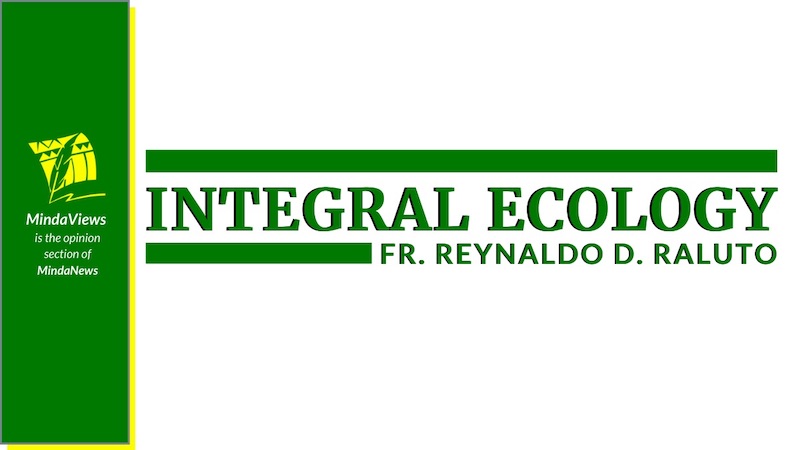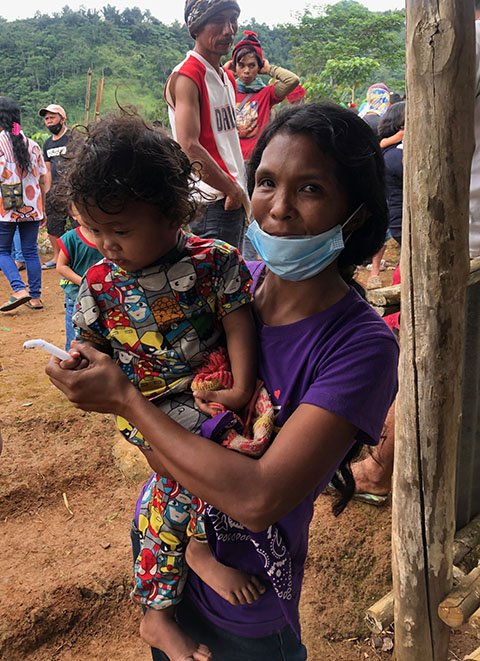
CAGAYAN DE ORO CITY (MindaNews / 9 October) – There are some social advocates who refuse to describe the indigenous people (IP) as oppressed people and victims of historical injustices perpetrated by Christian colonizers. In effect, they do not find any reason for the present generation of Christians to ask for forgiveness from IPs. This perspective can be challenged by revisiting the history of colonization in the Philippines and by analyzing the root cause of dehumanizing poverty suffered by many IPs.

It cannot be denied that there are oppressed indigenous peoples. See, for instance, the thousand families of Manobo-Pulangihon tribe driven out of their community in Barangay Butong, Quezon town in 2017.[i] This painful scenario may be seen as a continuation of the oppressive colonization suffered by IPs that began almost 500 years ago. For this reason, the Indigenous Peoples’ Sunday cannot be celebrated faithfully without turning our gaze to this sad reality.
The Dehumanizing Poverty of Many IPs
Many of our IP brothers and sisters are collectively suffering from socio-economic poverty, which is evident in their difficulty to meet basic human needs such as food, clothing, shelter, basic health care, basic education, work, and the necessary means of livelihood to live as a human person in dignity. Many of them are impoverished by oppressive and unjust social structures in our capitalistic market-economy.
Many IPs are also struggling against socio-cultural poverty. Their cultural oppression, according to Virgil Elizondo, “has more to do with the very reality of who [they] are, where they were born, the color of their skin, the shape of their body, the language they speak, the ethnicity that radiates through every fiber of their being.”[ii] In this sense, the ongoing racial and sexual discriminations today may be seen as sociocultural expressions of dehumanizing poverty.
The Dominant Approaches to Solve the Economic Poverty
Liberation theologians are well known for criticizing the two dominant strategies of overcoming economic poverty. On one hand, there is the empirical solution to poverty that tends to mobilize the wealthy people in order to help the poor. This approach tends to consider those who have less in life as mere objects of pity and charity by those who have more in life. Rich people are encouraged to alleviate poverty either by giving alms or donations to the poor. Unfortunately, this dole-out system and paternalistic response to poverty would only make the poor ever dependent on the rich and passive members of society.
On the other hand, there is the functional approach that offers a modern solution to poverty. This developmental approach accepts the fact that the poor are materially dispossessed but equally recognizes their labor potentials, which can be utilized by modern society to speed up the march toward development and progress. Furthermore, this approach recognizes that the poor have natural resources that can be utilized for production and global market. It sees the need to educate and professionalize the poor so that they can eventually be inserted in the production process under the capitalist system.
The Liberative Approach
The liberative approach does not subscribe to both foregoing approaches. The proponents of liberative approach seek to help the poor discover their immense capacity to overcome oppression by becoming subject or agent of their own liberation. Moreover, they do not treat the poor as mere passive objects of charity by the rich benefactors. Furthermore, they affirm that the phenomenon of poverty is a negative social reality caused by systematic oppression and exclusion of the “other.” Thus, their liberative approach seeks to transform “the type of society that always produces and reproduces poor and socially-excluded human beings.”[iii]
The liberative solution to poverty entails transforming all forms of oppression that keep the poor entangled in the cycle of poverty. To do this, “the oppressed come together, come to understand their situation through the process of conscientization, discover the causes of their oppression, organize themselves into movements, and act in a coordinated fashion.”[iv] By doing this, the poor are actively involved in the construction and process of their own “liberation that will lead to a new type of relationship in production, political structures, and the creation of value.”[v]
There is a need to recognize that the causes of dehumanizing poverty are extremely complex. It can be argued that each form of poverty requires a specific appropriate response. For instance, the socio-cultural poverty suffered by the IPs needs more than just liberation from socioeconomic oppression. The IPs are suffering from the sort of cultural subjugation that “has reached to the heart of the forces that produce culture”[vi] to the effect of paralyzing their autonomous and potential civilizing process. Thus, aside from socio-economic liberation, they need to be liberated from a cultural oppression that has been enslaving them since the colonial period, which subtly continues to the present in the form of the globalized culture of modernity.
The Imperative to Struggle for Agrarian Justice
Pope John Paul II was the first pope to officially recognize the intimate connection between IPs and their land. It was clear to him that when “indigenous peoples are deprived of their land, they lose a vital element of their way of life and actually run the risk of disappearing as a people.”[vii] IPs identify themselves with the ancestral land so intimately that separation from it would naturally lead to the destruction of their culture and eventually to their extinction. As such, John Paul II rightly links tribal peoples’ land rights with the right to life.
In Laudato Si’ (LS),[viii] Pope Francis wants us to learn from IPs who treat land not as commodity but as “a gift from God and from their ancestors who rest there, a sacred space with which they need to interact if they are to maintain their identity and values” (LS 146). He laments that the global trend of modern cultures forces IPs “to abandon their homelands to make room for agricultural or mining projects which are undertaken without regard for the degradation of nature and culture” (LS 146).
A concrete way to defend IPs, therefore, is to join the IPs in their struggle for agrarian justice and help them cope with the negative effects of modern cultures.
[MindaViews is the opinion section of MindaNews. Reynaldo D. Raluto is a Roman Catholic priest of the Diocese of Malaybalay. He is the Academic Dean of St. John Vianney Theological Seminary in Cagayan de Oro where he also teaches fundamental/systematic theology and Catholic social teaching. He is the author of Poverty and Ecology at the Crossroads: An Ecological Theology of Liberation in the Philippine Context (Quezon City: Ateneo de Manila University Press, 2015). His ecological advocacy includes planting/growing Philippine native trees, mountain climbing, and defending the rights of Indigenous Peoples.]
[i] See Jigger Jerusalem, “Bukidnon tribe won’t live as ‘squatters,’ seeks return to ancestral land,” Inquirer. Net (September 24, 2021); https://newsinfo.inquirer.net/1492092/bukidnon-tribe-wont-live-as-squatters-seeks-return-to-ancestral-land (accessed: September 24, 2021).
[ii] Virgilio Elizondo, “Culture, the Option for the Poor, and Liberation,” in The Option for the Poor in Christian Theology, ed. Daniel Groody (Notre Dame: University of Notre Dame Press, 2007), 157-68, on p. 159.
[iii] Leonardo Boff, “The Philosopher of the Poor” (16 January 2004); available from http://www.leonardoboff.com/ (date accessed: 14 September 2007).
[iv] Leonardo Boff and Clodovis Boff, Introducing Liberation Theology, translated from Portuguese by Paul Burns (New York: Orbis Books, 1987), 5.
[v] Leonardo Boff, Ecology and Liberation: A New Paradigm, trans. John Cumming (New York, Orbis Books, 1995), 133.
[vi] Leonardo Boff, Good News to the Poor: A New Evangelization, translated by Robert Barr (Tunbridge Wells: Burns and Oates, 1992).
[vii] John Paul II, “To Build Peace, Respect Minorities: World Day of Peace Message,” December 8, 1988, Origins 18 (1988), 466-469, on p. 468.
[viii] Francis, Laudato Si’: On Care for Our Common Home (May 24, 2015).







